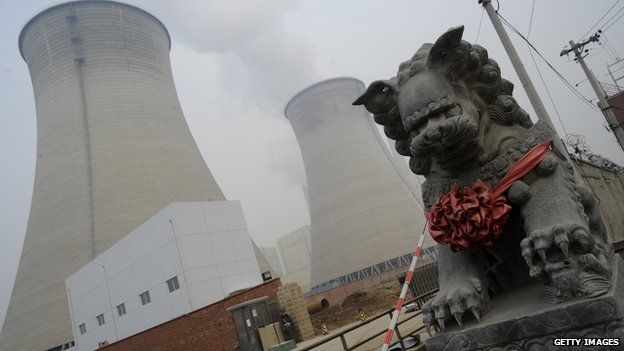Full extent of global coal 'binge' is hidden, say researchers
- Published

The climate impacts of the world's fossil-fuelled power plants are being underestimated because of poor accounting, say researchers.
Governments would get a truer picture if they included the lifetime emissions of a facility in the year it goes into production
These "committed emissions" have been growing by 4% a year between 2000 and 2012, the scientists say.
Power plants in China and India alone account for half of this commitment.
At present, UN accounting procedures only include the emissions from coal and gas powered electricity generation in the year in which they occur.
According to the authors of the new paper, this method means they are missing a significant part of the picture.
"We are trying to get past a kind of myopia that sets in when people focus exclusively on the emissions of the day," said one of the authors, Prof Robert Socolow from Princeton.
By taking an expected production life of 40 years, the researchers calculated that the new coal and gas plants built in 2012 would, in total, produce around 19bn tonnes of CO2.
This is significantly more than the 14bn tonnes produced by all the existing fossil fuel plants in the world in the same year.
"We've been hiding things from ourselves," said Prof Socolow.
A new coal plant every week
What Prof Socolow termed the "Chinese power plant construction binge", which has occurred since 1995, was a major factor in the story.
Plants in China represent 42% of committed future emissions, while India is responsible for 8%.
That contrasts with the US and Europe, which between them account for 20% of the committed carbon.
"The US and Europe, for the most part, have not paid attention that such large consequences were turning up in the development decisions of the developing world," said Prof Socolow.
While the share of commitments related to natural gas plants has increased from around 15% in 1980 to 27% in 2012, much of this development is focussed on the Middle East.
Apart from this area, almost the entire developing world is looking to coal as the power plant fuel of choice on the road to industrialisation.
According to the report, all the existing fossil fuel plants in world will contribute 300bn tonnes of CO2 over their lifetimes, putting a significant dent in the remaining carbon budget that would prevent a global temperature rise of 2C, the threshold of dangerous climate change according to scientists.
"Worldwide, we've built more coal-burning power plants in the past decade than in any previous decade, and closures of old plants aren't keeping pace with this expansion," said co-author Prof Steven Davis at University of California, Irvine.
"Far from solving the climate change problem, we're investing heavily in technologies that make the problem worse," he said.
The researchers say that their calculation of committed emissions doesn't mean they are unavoidable.
They argue that with properly functioning carbon markets and the development of carbon capture and storage technology (CCS), the scale of the impacts on climate could be reduced.
"The extra piece of this is CCS," said Prof Socolow.
"There is a tool, it does costs money - but it is one of the ways of having your cake and eating it too."
The research has been published in the journal Environmental Research Letters.
Follow Matt on Twitter @mattmcgrathbbc.
- Published21 August 2014
- Published2 June 2014
- Published14 April 2014